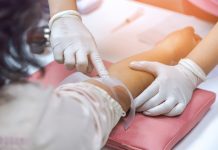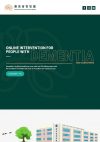Earlier this year, Yourgene Health entered into a collaboration with Cytox to run their genoSCORE-LAB assay in our laboratory. genoSCORE-LAB™ is a new non-invasive test that can predict the risk of an individual developing Alzheimer’s disease from a simple saliva sample
Dementia has often been described as a global epidemic, both economically and societally, for the 21st century. The incidence of Alzheimer’s disease, the most common form of dementia, is rapidly increasing in developing countries due to social and demographic changes.
Alzheimer’s disease
With an ageing population, the number of cases of late-onset Alzheimer’s disease (LOAD), which usually affects those over 65 years old is only going to escalate. Effectively, in the developed world, where our life expectancy has increased over the last 100 years or so, Alzheimer’s disease is a measure of that success and of that prolonged life expectancy. The economic cost in the UK alone, according to the Alzheimer’s Society, is approximately £34.7 billion a year.
While the incidence of Alzheimer’s is growing in the developed world, potentially the greatest future impact will be seen in the emerging economies. Globally, Alzheimer’s is least prevalent in Sub-Saharan Africa; but is expected to have some of the highest growth rates in the future, which will inevitably incur the same societal and economic costs currently observed in the developed world.
For now, therapeutic treatments in Alzheimer’s are limited and they target symptoms rather than the disease itself. However, there is increasing evidence that lifestyle changes can slow disease progression and delay the onset of cognitive decline associated with Alzheimer’s disease.
Predicting Alzheimer’s disease
In recent years, more has become known about the genetics linked to the risk of developing Alzheimer’s disease. Cytox has developed a test called genoSCORE(TM)-LAB, a new non-invasive test that can predict the risk of an individual developing Alzheimer’s disease from a simple saliva sample. This test generates a polygenic risk score (PRS), by analysing an individual’s genetics against an array of over 100,000 single nucleotide polymorphisms – small genetic variations – that are associated with, or protective against, the risk of developing Alzheimer’s disease.
While it is not possible to change an individual’s genetic risk, there is growing evidence that understanding that risk encourages high-risk individuals to proactively manage the environmental and lifestyle risk factors that can delay the onset of symptoms and subsequent slow cognitive decline. Indeed, in 2015, Professor Miia Kivipelto first published data from the FINGER Study (1) which showed that aggressively treating some of the modifiable risk factors in individuals considered at risk of Alzheimer’s disease can have a real benefit. Within just two years, those participants that followed the multidomain intervention (diet, exercise, cognitive training and cardiovascular monitoring) were significantly less likely to suffer measurable cognitive decline compared to the control group.
With modifiable factors accounting for more than 40% of the risk for dementia, the adoption of behaviours to monitor and treat factors such as hypertension, type 2 diabetes, elevated cholesterol and smoking, are likely to bring benefit to time of onset and rate of cognitive decline in Alzheimer’s disease. In addition, interventions such as physical exercise, cognitive “brain-training” and social interactions confer significant benefits in reducing the decline. Understanding a person’s genetic risk profile will enable them to make substantial modifications to health and lifestyle to slow down the cognitive decline due to Alzheimer’s disease.
genoSCORE(TM)-LAB
genoSCORE-LAB is only available through a specialist clinician’s recommendations and the test analysis is done at Yourgene Genomic Services in Manchester, UK. For further information about genoSCORE-LAB please visit www.genoscore-lab.com
Reference
Please note: This is a commercial profile
© 2019. This work is licensed under CC-BY-NC-ND.
Contributor Profile
Contributor Profile
Editor's Recommended Articles
-
Must Read >> Alzheimer’s disease: Incurable but preventable?

























